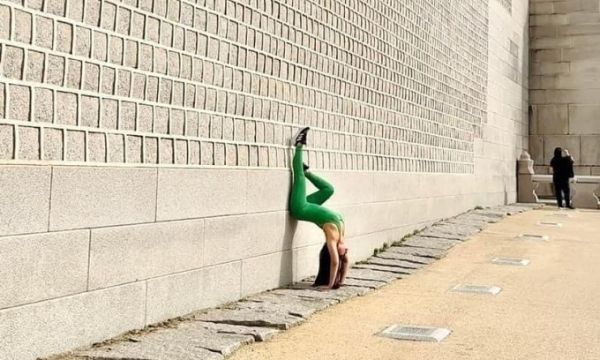
The 37-year-old woman from Hanoi, visiting South Korea from Oct. 29 to Nov. 4, was photographed performing handstand yoga pose by the stone wall near Gwanghwamun, the main gate of the royal palace.
One photo shows her leaning against the palace’s outer wall while in the yoga pose.
|
A photo shared on social media shows a Vietnamese tourist leaning against Gyeongbokgung Palace’s wall while in a yoga pose. |
Major Korean media outlets such as Chosun, Yonhap, Edailyas well as MBC and JTBC television networks, reported on the incident on Nov. 5, igniting a heated debate on South Korean social media.
“This place is sacred and a symbol of Korean tourism; this woman’s actions are shameful,” wrote one South Korean netizen.
Another added, “Of course, it should have been sanctioned. What if the wall is damaged?”
Others echoed this sentiment, with comments like, “There are always attention seekers,” and “If I did that in Vietnam, I’d be removed immediately.”
Professor Seo Kyung-duk of Sungshin Women’s University criticized the tourist’s actions as inappropriate, highlighting that Gyeongbokgung Palace is a national monument and that placing one’s feet on the wall risks potential damage, Maeil Business Newspaper reported.
While practicing yoga is free anywhere, leaning directly on national cultural assets in other countries is clearly a mistake, Seo added, calling on Korean authorities to prevent similar actions in the future.
However, some netizens also defended the tourist’s actions.
A netizen wrote on online platform Naver” “I don’t think that’s a big problem. Practice more. Korea is a free and democratic country, so you can practice yoga without any worries.”
Another netizen said there was a fashion show at Gyeongbokgung Palace. “I don’t think it’s wrong to wear leggings and do handstands yoga outside the palace.”
Gyeongbokgung, or Gyeongbokgung Palace, was the primary royal residence during the Joseon dynasty. Built in 1395 in northern Seoul, it served as both the royal family’s residence and the seat of government. Today, it is one of South Korea’s most popular tourist attractions.
Although there is no official dress code for visitors, most choose modest attire, avoiding flip-flops, shorts, and short skirts, as these are generally considered inappropriate in South Korea.